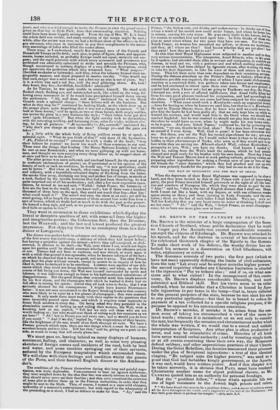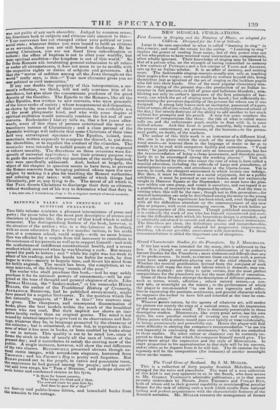DR. BROWN ON THE PAYMENT OF TRIBUTE.
DR. BROWN is the minister of a large congregation of the Seces. sion Church of Scotland, whose public declaration that he would no longer pay the Annuity-tax created considerable sensation amongst the citizens of Edinburgh. Dr. BROWN was attacked for his speech, and for the doctrine in several of his discourses on the celebrated thirteenth chapter of the Epistle to the Romans. To make short work of his defence, the worthy divine has em- bodied his sermons in a dissertation on Civil Obedience, with notes, explanatory or critical.
The discourse consists of two parts : the first part (which we have not seen) apparently defining the limits of civil submission, from the text "Let every soul be subject unto the higher powers;' the second inquiring whether any Christian limitation is attached to the injunction "Pay ye tribute also ; " and if so, on what mew sions and to what extent? In the management of this contro-
versy, Dr. BROWN displays considerable liberality, and much polemical and Biblical skill. But his views seem to us rather
confined, when he concludes that a Christian is bound by Apos- tolic injunction to pay taxes in the lump—that is, taxes collected for the general purposes of the state, because he can shut his eyes to any particular application—but that he is bound to refuse the payment of a tax collected for a specific religious purpose, if the purpose be opposed to his conscientious conviction.
Dr. BROWN'S mistake, if mistake it be, arises from the com- mon error of taking too circumscribed a view of the mere u0-
hated words ; whereas it is incumbent on us not only to consider the text, but frequently the occasion and circumstances under which the whole was written, if we would rise to a sound and catholic interpretation of Scripture. Any other plan is often productive of error, and may be stimulative of crime. Heretics of all kinds have never wanted verbal authority ; and by wresting single texts, or at all events construing them their own way, the Romanists defend celibacy, and other superstitious practices of their Church. During the Great Rebellion, the fanatics massacred their prisoners
under the plea of Scriptural injunctions : a text of this identical chapter, "Be subject unto the higher powers," was used as a pool' that God had forbidden kingly government, or the Apostle, it was said, would have written power. And if this chapter us W be taken narrowly, it is obvious that PAUL must have rendered Christianity another name for abject political slavery, as Mr. CANNING quoted him as an authority for personal bondage.
But the '6 pestilent fellow,"* whose whole apostolic life wee one of legal resistance to the Jewish high priests and rulers,
• "We have found this man to be a pestilent fellow, nude mover of sedition meal all the Jess throughout the world, and a ringleader of the sect of the NAISfelleV: Eh° also bath gone shout to profane the temple."—Acts.tuds. was not guilty of any such absurdity. Judged by common sense, his directions both to subjects and citizens only amount to this- " Your conversion has not. changed either your political or your social state ; whatever duties you were bound to fulfil as citizens or as servants, those you are still bound to discharge. By be- coming Christians, you are not freed from subordination or tribute: the effect of baptism is not to alter your worldly, but your spiritual condition—the kingdom is not of this world.' So far from Romans mil. inculcating general submission to all rulers or under all circumstances, It does not seem to us to meddle with the respective rights or duties of subjects and governors. All that the " mover of sedition among all the Jews throughout the world" really says, is this—" Your new character gives you no stew political or civil Immunities."
If any one doubts the propriety of this interpretation, a ino• ment's reflection, we think, will not only convince him of its soundness, but also show the consummate prudence of the great Apostle of the Gentiles. The Epistle to the Romans, like all the other Epistles, was written to new converts, who were generally of the lower ranks of society ; whose temperament and disposition, as shown by the mere fact of their conversion, was evidently not of the most phlegmatic kind, and who with some degree of . spiritual exaltation would naturally combine the hot zeal of new converts. Ecclesiastical history tells us, that a few years after- wards, many of this class of' persons entertained the most ex- traordinary notions of Christianity ; and a close perusal of the Apostolic writings will indicate that some Christians of their time held very extravagant opinions.t The Epistles, indeed, were sometimes written expressly to compose the discord, to put down the absurdities, or to regulate the conduct of the churches. The remainder were intended to unfold points of faith, or to expound or enforce morality. The directions on these occasions were fie.
quently of' universal application ; but their primary purpose was to guide the conduct, or rectify the mistakes of the newly-baptized, who were specifically addressed. And, looked at largely, the object of the chapter in question seems to have been, to prevent the Roman converts from bringing political odium upon the new religion by making it a plea for insulting the Roman authorities
and refusing to pay taxes ; with neither of which things had 'Christianity, per se, any thing to do. The moral of all which is, that PAUL directs Christians to discharge their duty as citizens, without wandering out of his way to determine what that duty is. f Sea, inter cilia, I Corinthians, clap. v. for a singular example of mural anomaly.



























 Previous page
Previous page